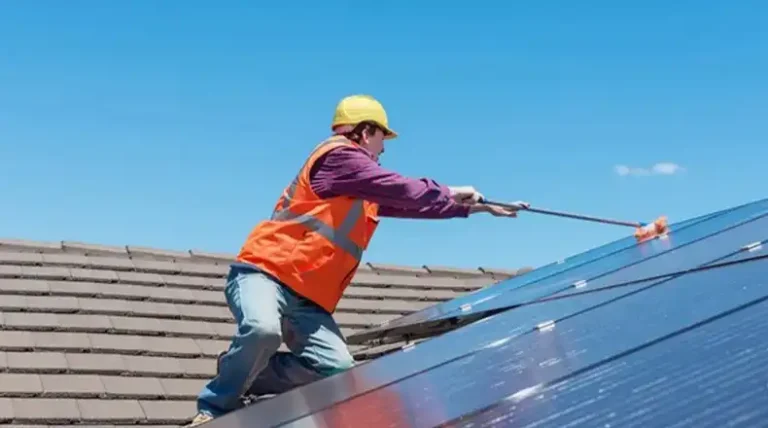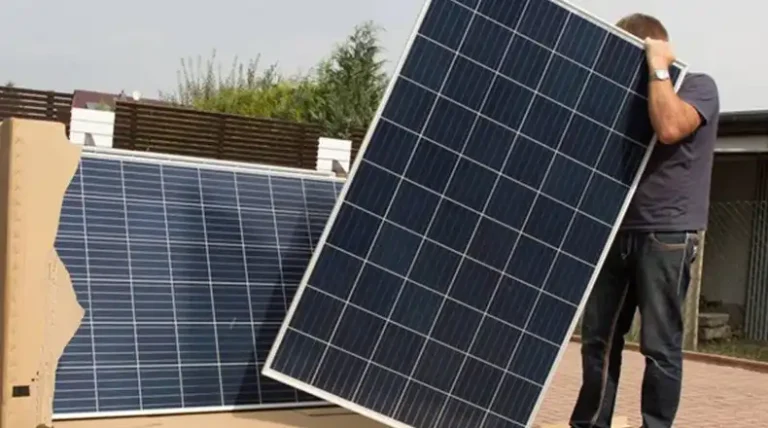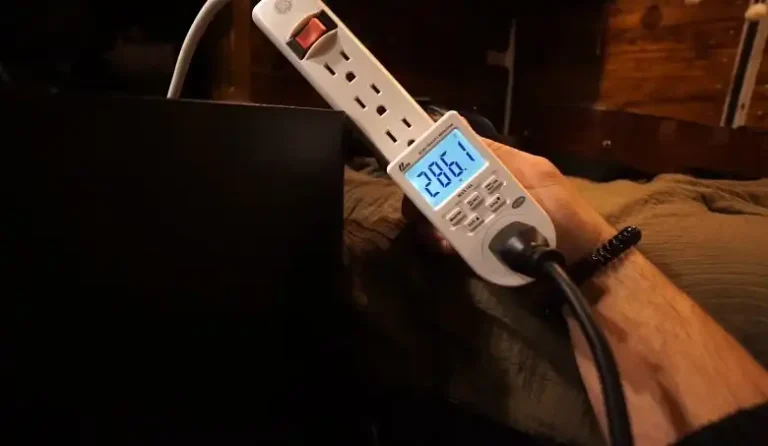Can You Put Solar Panels On Fences
While completely relying on solar energy, many homeowners face the challenge of limited roof space or shaded areas, making it difficult to install traditional rooftop solar panels effectively. This has led people to explore alternative options, such as mounting solar panels on fences, which can be a game-changer for those seeking to maximize their solar energy potential.
Yes, you can absolutely put solar panels on fences! In fact, fence-mounted solar panels have emerged as a popular and practical solution for homeowners and businesses alike.
If you’re curious about the feasibility, installation process, and potential benefits of fence-mounted solar panels, this guide will provide you with all the information you need.
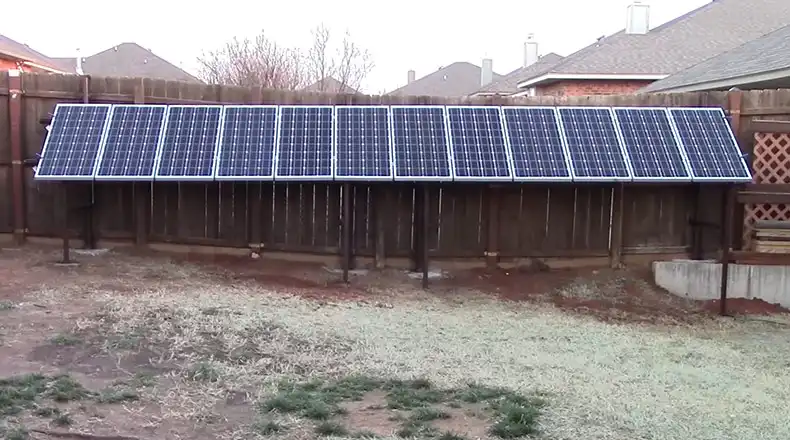
Is It Possible to Put Solar Panels on Fences?
Yes, you can absolutely put solar panels on fences, In fact, solar panel fences can be found on the market which are specifically designed to be affixed to a fence. By utilizing the vertical space of fences, you can unlock a previously untapped area for solar energy generation, potentially increasing your overall solar output and reducing your reliance on traditional energy sources.
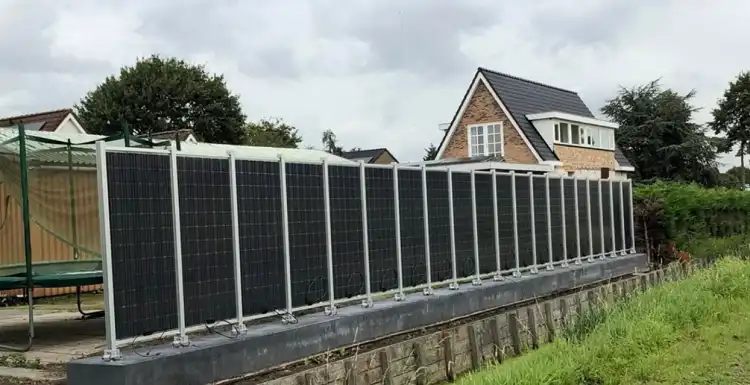
However, when it comes to installing solar panels on fences, several factors need to be taken into account to ensure optimal performance and longevity. These include:
- Fence Orientation: The orientation of your fence plays a crucial role in determining the amount of sunlight it receives throughout the day. Ideally, your fence should face south (in the northern hemisphere) or north (in the southern hemisphere) to maximize solar exposure.
- Fence Height and Length: The height and length of your fence will dictate the number of solar panels you can install and the potential energy output. Taller and longer fences provide more surface area for panel installation, increasing your energy generation capacity.
- Fence Material and Stability: The material and stability of your fence are essential considerations. Fences made of durable materials like wood, metal, or concrete are generally suitable for solar panel installation, as they can withstand the weight and wind loads. However, older or dilapidated fences may require reinforcement or replacement before installation.
- Shading Analysis: Conduct a thorough shading analysis to identify any potential obstructions, such as trees, buildings, or other structures, that could cast shadows on your fence-mounted solar panels. Even partial shading can significantly reduce the system’s efficiency.
- Local Building Codes and Regulations: Before proceeding with fence-mounted solar panel installation, it’s crucial to check with your local authorities regarding building codes, permits, and any specific regulations that may apply to your area.
Advantages of Fence-Mounted Solar Panels
Installing solar panels on fences offers several advantages over traditional rooftop installations, including:
- Increased Solar Exposure: Fences typically receive more direct sunlight throughout the day compared to rooftops, which may experience shading from chimneys, vents, or neighboring buildings. This increased solar exposure can lead to higher energy generation.
- Space Optimization: For homeowners with limited roof space or those living in apartments or condominiums, fence-mounted solar panels provide a viable solution to utilize available vertical space effectively.
- Easy Access and Maintenance: Fence-mounted solar panels are generally more accessible for cleaning, maintenance, and repairs compared to rooftop installations, which can be challenging and potentially dangerous to access.
- Aesthetic Appeal: Depending on the design and placement, fence-mounted solar panels can add a modern and visually appealing touch to your property.
- Flexibility and Modularity: Fence-mounted solar panel systems can be easily expanded or reconfigured as your energy needs change, offering flexibility and modularity.
Challenges and Considerations
While fence-mounted solar panels offer numerous benefits, there are also some challenges and considerations to keep in mind:
- Structural Integrity: Ensuring the structural integrity of your fence is crucial to support the weight of the solar panels and withstand potential wind loads. Reinforcement or additional anchoring may be required, especially for older or weaker fences.
- Panel Orientation: Unlike rooftop installations, where panels can be positioned at an optimal angle for maximum solar exposure, fence-mounted panels are typically fixed in a vertical orientation. This may result in slightly lower energy production compared to optimally angled rooftop systems.
- Potential Shading: Depending on the surrounding environment, nearby trees, buildings, or other structures could cast shadows on your fence-mounted solar panels, reducing their efficiency.
- Wind Loads: Fence-mounted solar panels are more exposed to wind forces compared to rooftop installations. Proper mounting and anchoring techniques are essential to prevent potential damage or dislodging of the panels.
- Access and Safety: While fence-mounted solar panels are generally more accessible than rooftop installations, proper safety measures and equipment should still be used during installation, maintenance, and cleaning.
Are Solar Panel Fences Worth It?
While the initial investment in a solar panel fence may seem substantial, it’s essential to consider the long-term benefits and potential cost savings. However, maximizing the efficiency of your solar panel fence is crucial to ensure it remains a worthwhile investment over time.
Various factors like dust accumulation, shading, snow accumulation, electrical issues, and physical damage can impact the efficiency of your solar panel fence, potentially reducing its energy output and overall return on investment. By addressing these factors and taking the recommended actions, you can ensure that your solar panel fence operates at peak efficiency, maximizing energy production and cost savings over its lifespan.
Furthermore, investing in high-quality solar panels, appropriate mounting systems, and professional installation can also contribute to the long-term efficiency and durability of your solar panel fence. While the initial cost of a solar panel fence may be higher than traditional fencing solutions, the long-term energy savings, environmental benefits, and potential financial incentives or rebates can make it a worthwhile investment for many homeowners and businesses.
Bonus: Which One Is the Right Solar Panels for Your Fence
When it comes to installing a solar-powered electric fence, selecting the appropriate solar panels is crucial to ensure optimal performance, efficiency, and longevity. Unlike traditional ground-mounted or rooftop solar installations, solar fences utilize vertical space, making them an ideal choice for locations with limited horizontal expanses. To help you navigate through the various options available, let’s explore the three main types of solar panels commonly used for fence installations:
Standard Solar Panels
Standard solar panels are the most common and affordable option for solar-powered electric fences. These panels are known for their high durability and can withstand harsh environmental conditions, making them a reliable choice for outdoor installations.
Note: Their relatively lower wattage may limit the energy output, especially in areas with lower solar irradiance or longer fence lines.
Bifacial Solar Panels
Bifacial solar panels are a more advanced and efficient option for solar-powered electric fences. These panels can generate electricity from both the front and rear sides, thanks to their double-sided design. This unique feature allows them to capture reflected sunlight from the ground or other surfaces, increasing their energy production capabilities.
Premium Solar Panels
For those seeking the ultimate in performance and customization, premium solar panels offer a tailored solution for solar-powered electric fences. These panels are typically designed to meet specific requirements and can be customized in terms of wattage, size, and additional features.
Summary
Installing solar panels on fences can be a brilliant solution for homeowners and businesses seeking to maximize their solar energy potential while optimizing available space. By considering factors such as fence orientation, material, and shading, you can create an efficient and effective fence-mounted solar panel system that harnesses the power of the sun and reduces your reliance on traditional energy. If you have any remaining questions or require further assistance, please don’t hesitate to leave a comment below. We’ll be happy to address your concerns and provide additional guidance. Thank you for joining us on this solar journey, and we wish you the best of luck in harnessing the power of the sun with fence-mounted solar panels!
Frequently Asked Questions (FAQs)
Question 1: How Much Energy Can Fence-Mounted Solar Panels Generate?
The energy generation potential of fence-mounted solar panels depends on various factors, including the number of panels, their efficiency, the fence orientation, and local climate conditions. On average, a well-designed fence-mounted system can generate enough energy to offset a significant portion of a household’s or business’s energy consumption.
Question 2: Are Fence-Mounted Solar Panels More Expensive Than Rooftop Systems?
The cost of fence-mounted solar panels can vary depending on factors like the mounting system, panel quantity, and installation complexity. In some cases, they may be more expensive than rooftop systems due to additional reinforcement or anchoring requirements. However, the long-term energy savings and increased solar exposure can offset the initial investment.
Question 3: Can Any Fence Material Support Solar Panels?
While most durable fence materials like wood, metal, or concrete can support solar panels with proper reinforcement, some fence types may not be suitable. It’s essential to have a professional assess your fence’s structural integrity and make any necessary modifications or reinforcements before installation.
Question 4: How Long Do Fence-Mounted Solar Panels Last?
The lifespan of fence-mounted solar panels is similar to that of rooftop systems, typically ranging from 25 to 30 years with proper maintenance and care. However, the mounting system and electrical components may require periodic inspection and replacement as needed.
Question 5: Do Fence-Mounted Solar Panels Require Special Permits?
In many areas, installing fence-mounted solar panels may require obtaining permits from local authorities, homeowners’ associations, or other relevant bodies. It’s essential to check and comply with all applicable regulations and codes in your area before proceeding with the installation.

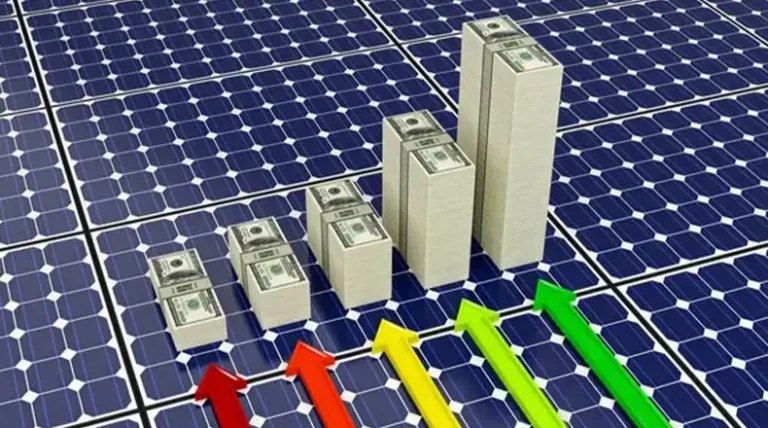
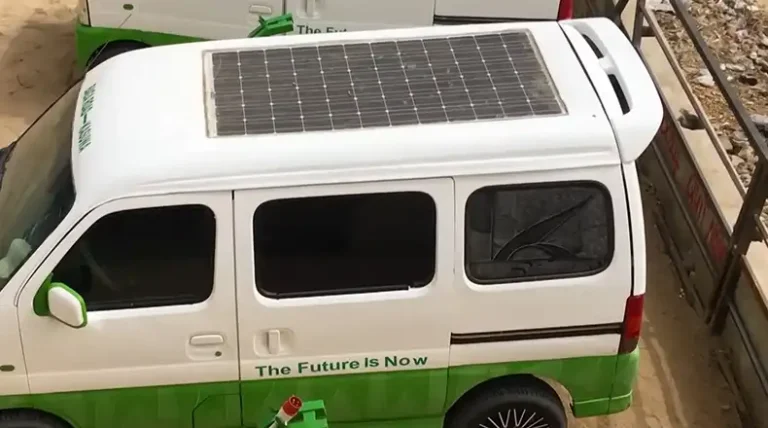
![[Explored] Can You Use Mirrors To Redirect Sunlight On Solar Panels?](https://www.itekenergy.com/wp-content/uploads/2023/08/can-you-use-mirrors-to-redirect-sunlight-768x428.webp)
